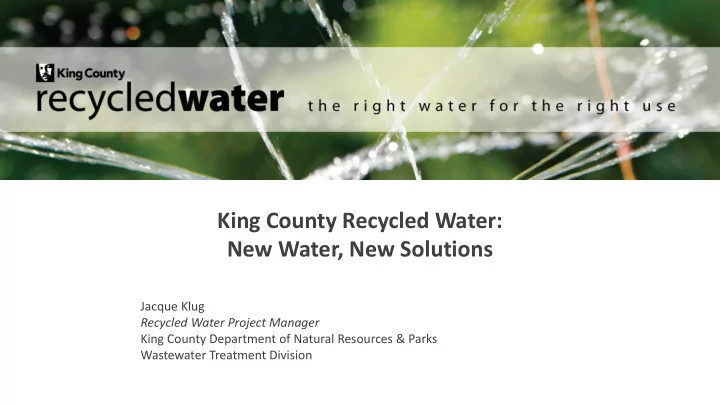

King County Recycled Water: New Water, New Solutions Jacque Klug Recycled Water Project Manager King County Department of Natural Resources & Parks Wastewater Treatment Division
1. Current state of reclaimed/recycled water use 2. Washington State regulations and uses 3. King County water reuse 4. Innovative water resource projects using water reuse 5. Future of water reuse
Recycled Water is: Also known as “Reclaimed Water” or “Reuse Water”
The many uses of recycled water… Industrial process water Irrigation Environmental Enhancement Even for potable water
Direct and Indirect potable reuse projects (as of April 2017) From 2017 Potable Reuse Compendium, EPA
Reclaimed Water in Washington • Authorized in 1992 in Washington, codified in RCW 90.46. • Regulated jointly by Department of Ecology and Department of Health.
Water quality requirements align with end use Environmental uses requires additional treatment. Water where public can Reclaimed water rule contact requires Class A creates approval water. pathway for direct reuse.
King County recycled water is safe! Recycled water treatment produces water with zero bacteria but keeps valuable nutrients plants need to thrive! King County has been safely recycling water for nearly 20 years.
What about pharmaceuticals and personal care products?
Putting Risk Into Perspective Example: A child could play on a lawn irrigated with recycled water for 67,000 years before being exposed to the equivalent of one dosage of Ibuprofen. Source: WateReuse Research Foundation
Recycled water supplies water to 29 communities in Washington
Why does King County make recycled water? • Reduce reliance on Puget Sound for discharge • Keeps more water in streams and aquifers • Recycle nutrients and reduce fertilizer use • Supports conservation and recycling values of our community
King County distributed 76.9 million gallons of recycled water in 2018
South Plant Recycled Water Distribution • 1 million gallon per day production capacity • 40.5 million gallons (MG) recycled in 2018 • 4.9 MG distributed to customers • 35.6 MG used at South Treatment Plant • 0.1% of effluent recycled and distributed to customers in 2018
Carnation Recycled Water enhances wetlands at Chinook Bend Wetland in 2007 31 million gallons of water produced at the Carnation treatment plant was used to enhance the wetland in 2018 Wetland today
Brightwater Recycled Water Distribution • 12 million gallon per day recycled water treatment capacity • 40.7 million gallons distributed in 2018 • Approximately 1% of effluent produced in summer months was recycled in 2018
Sammamish Valley Irrigators & Water Rights Source: Department of Ecology
Sammamish Valley Recycled Water Project • Keep water in the Sammamish River • Enhances parks, golf courses and local agriculture • Creates opportunities for water markets/trading water rights • Drought-resistant water supply
INNOVATIVE RECYCLED WATER PROJECTS
• Creates more water supply for City of farmers • City meets outfall temperature limits Hermiston, OR
• Economic development -water supply City of for data centers, food processors Quincy, WA • Pursuing Aquifer Storage and Recovery
• Decentralized non-potable reuse • Greywater and rainwater captured and Bullitt Center reused onsite for non-potable uses • Composting toilets treat and reuse human Seattle, WA waste 23
FUTURE DRIVERS FOR WATER REUSE IN THE PACIFIC NORTHWEST
Puget Sound Nutrient Source Reduction Project Department of Ecology is investigating nitrogen limits for wastewater plants to improve water quality in Puget Sound.
2015 State of Knowledge: Climate Change in Puget Sound. Climate Impacts Group Recycled water may help respond to changing watershed hydrology due to climate change.
Find out more: Jacque.Klug@kingcounty.gov Tel: 206-477-4474 www.kingcounty.gov/recycledwater
Recommend
More recommend